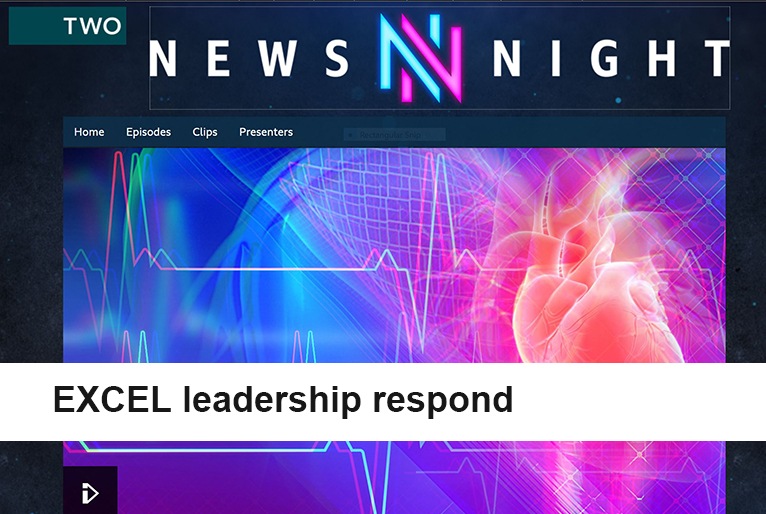 Gregg Stone (The Zena and Michael A Wiener Cardiovascular Institute, Icahn School of Medicine at Mount Sinai, New York, USA), on behalf of the EXCEL leadership, has sent Cardiovascular News (and other media outlets) a 3,500-word document refuting the recent claims about EXCEL that were made by BBC Newsnight on Monday 9 December 2019. The document states that the principal definition of myocardial infarction (MI) “never changed” (and that David Taggart now acknowledges this), that there was “absolutely no attempt to withhold meaningful data”, and that “regardless of the motivations and actions of others”, the EXCEL leadership will “continue to exercise the highest scientific principles and ethics of our profession”.
Gregg Stone (The Zena and Michael A Wiener Cardiovascular Institute, Icahn School of Medicine at Mount Sinai, New York, USA), on behalf of the EXCEL leadership, has sent Cardiovascular News (and other media outlets) a 3,500-word document refuting the recent claims about EXCEL that were made by BBC Newsnight on Monday 9 December 2019. The document states that the principal definition of myocardial infarction (MI) “never changed” (and that David Taggart now acknowledges this), that there was “absolutely no attempt to withhold meaningful data”, and that “regardless of the motivations and actions of others”, the EXCEL leadership will “continue to exercise the highest scientific principles and ethics of our profession”.
The EXCEL investigators, via Stone, have requested that we “post this letter in full” on our website, which we have done—you can download the full statement here. We have also put the summary points of the document in our original story about the Newsnight investigation and as well as published them below. Stone has told us that, following this statement, he and his co-investigators will not respond to further requests for comments.
Summary
Choice of the procedural myocardial infarction definition
It was agreed by all involved (including surgical colleagues) that the universal definition (UD) was not suitable because of ascertainment bias, different criteria for percutaneous coronary intervention (PCI) and coronary bypass grafting (CABG) and lack of demonstrated correlation with prognosis. The protocol definition of procedural myocardial infarction (MI) that met these criteria was thus selected and agreed to by unanimous consent.
The protocol MI definition changed
This is absolutely incorrect—the principal definition of MI never changed throughout the course of the trial.
The rate of procedural MI according to universal definition has been deliberately withheld. Procedural MI according to universal definition was listed in the protocol as one of ~35 exploratory secondary endpoints. This definition is based on troponins, the collection of which was optional in EXCEL and was unfortunately infrequently performed. Thus, reporting procedural MI rates according to UD was not possible. An exploratory attempt was made to assess procedural UDMI rates using troponins in some patients and CK-MB measures in others. However, this is not scientifically sound given the different sensitivities of these assays. EXCEL has published data that the protocol definition of MI was strongly correlated with subsequent mortality within the trial, whereas smaller biomarker elevations (as included in the universal definition criteria) would not have been prognostic. And until these recent events there had been no requests from any source to prioritise reporting procedural MI according to universal definition. Thus, there was absolutely no attempt to withhold meaningful data. Nonetheless, EXCEL commits to publish a future manuscript reporting the rates and implications of MI according to numerous definitions, including the universal definition using CK-MB data.
The all-cause mortality data from EXCEL was not strongly enough emphasised
All-cause mortality was a secondary underpowered endpoint and the modest difference noted between groups was not adjusted for multiplicity and is therefore statistically uncertain. In addition, it has no biological basis given that the clinical events committee adjudicated the excess to be principally due to sepsis and cancer occurring years after randomisation. Meta-analyses of 4,394 patients from four trials of drug-eluting stents vs. CABG (including EXCEL) show there is no difference in five-year mortality between PCI and surgery for left main disease. Even longer-term data (10-year follow-up from the SYNTAX trials) shows no difference in mortality. The distinction between all-cause mortality and cardiovascular mortality (which was very similar between PCI and CABG in EXCEL) was unfortunately not mentioned in the broadcast.
The DSMC raised concerns that were not adhered to
The independent Data Safety and Monitoring Committee met frequently to review unblinded EXCEL data, each time recommending that the study continue as planned without modification.
The ESC/EAPCI/EACTS Guidelines are unsafe
Guidelines are made on summated evidence from multiple trials and data input by independent experts in the field. The existing Guidelines which EXCEL helped to inform suggest stenting may be considered as a treatment for selected patients with left main stem coronary disease.













